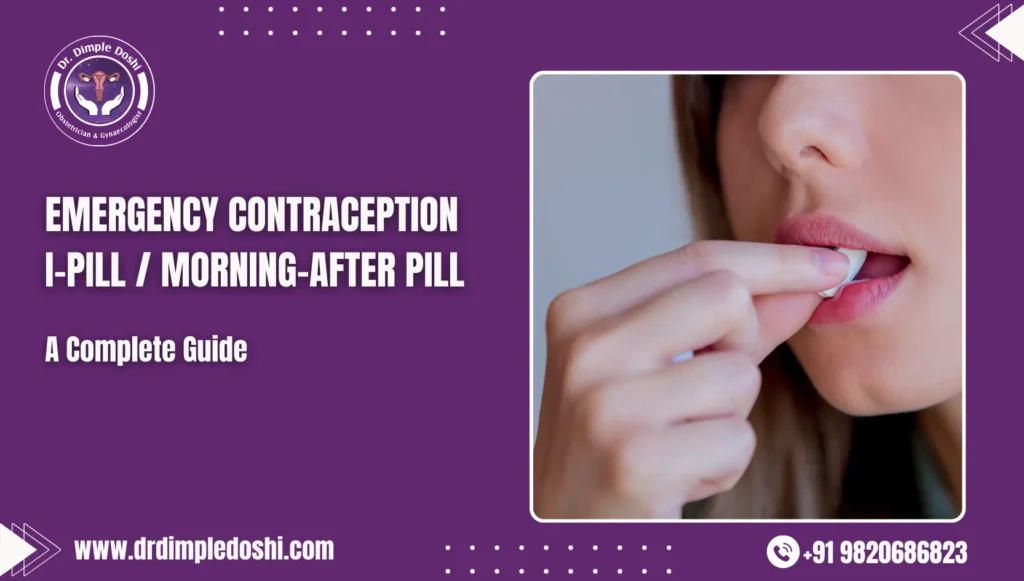Emergency Contraception (I-Pill / Morning-After Pill) – Safe Guide by Dr. Dimple Doshi

Table of Contents
Introduction
Learn about i-pill & types of emergency contraception from Dr. Dimple Doshi. Safe, reliable guidance for women after unprotected sex.
Have you ever faced the fear of pregnancy after unprotected sex, a missed condom, or a forgotten pill?
The thought of “what if I get pregnant?” can bring restless nights, stress, and overwhelming anxiety.
Emergency contraception (i-pill, morning-after pill, or copper IUD) provides a safe backup option. When taken on time, it helps prevent an unintended pregnancy and restores peace of mind.
What is Emergency Contraception?
A time-sensitive backup after unprotected sex that delays ovulation to lower pregnancy risk; not an abortion pill and not STI protection.
- Emergency contraception (EC) is used after unprotected sex to reduce pregnancy risk.
- It is not an abortion pill; it delays ovulation or prevents fertilization.
Common Names
Also called the morning-after pill, i-pill, postcoital pill; copper IUD is an emergency option too. Take as early as possible.
- I-pill
- Morning-after pill
- Postcoital pill
- Works best when taken ASAP (within 24 hours); some options work up to 5 days.
Types of Emergency Contraception
Three options: levonorgestrel pill, ulipristal pill, or copper IUD. Earlier use works better; copper IUD also gives long-term protection.
1) Levonorgestrel Pill (I-Pill, Plan B One-Step)
- Most available in India (i-pill, Unwanted-72, etc.).
- Take within 72 hours (3 days) after unprotected sex.
- Works by delaying ovulation.
- Effectiveness: about 85–90% if taken on time.
2) Ulipristal Acetate (EllaOne)
- More effective than levonorgestrel.
- Can be taken up to 120 hours (5 days) after intercourse.
- Works even when ovulation is closer. (Availability may vary in India.)
3) Combined Estrogen + Progestin (Yuzpe Regimen)
- Two doses of combined oral contraceptives, 12 hours apart.
- Less used now due to higher side-effects (nausea, vomiting).
4) Copper Intrauterine Device (Cu-T IUD)
- Most effective EC (>99%).
- Insert up to 5 days after unprotected sex.
- Provides long-term contraception (up to 10 years).
How Do Emergency Pills Work?
They mainly delay egg release and may hinder fertilization; won’t end an existing pregnancy. Take as soon as possible for best effect.
- Delay ovulation — stop egg release.
- Reduce chances of fertilization.
- May alter uterine lining, lowering implantation likelihood.
- They do not work if you are already pregnant.
When Should You Use Emergency Contraception?
Use after condom failure, missed pills, unprotected sex, or assault. The sooner you act, the better the protection.
- Condom break, slip, or forgotten.
- Missed 2+ birth-control pills.
- Unprotected sex unexpectedly.
- Sexual assault without protection.
When is It Not Suitable?
Not for routine use or if already pregnant. Some medicines or conditions limit pill choice—ask a clinician if unsure.
- Not a routine contraceptive method.
- If pregnancy has already occurred.
- Certain medical conditions or drug interactions may affect choice.
Side Effects
Usually mild: nausea, headache, tenderness, spotting, small cycle shifts. Test if period is over 7 days late or pain is severe.
- Nausea, vomiting
- Headache, dizziness
- Breast tenderness
- Spotting or delayed period
- Repeated use can disturb cycles and slightly raise ectopic risk—seek advice if concerns.
How Often Can You Take It?
Safe for occasional use but not a regular method. Start ongoing contraception after EC; use condoms for STI protection.
- Okay occasionally (ideally once per cycle if needed).
- Repeated use (3–5 times/month) is not advised.
- Consider regular pills, injectables, IUDs, or implants for ongoing contraception.
FAQs About Emergency Contraception
Best option depends on timing; ulipristal works up to 5 days. EC isn’t 100%; occasional use doesn’t harm future fertility.
- Which pill works best? Ulipristal is most effective; levonorgestrel (i-pill) is most available.
- Is it 100% effective? No—about 85–95%, depending on how early it’s taken.
- Does it affect fertility? No long-term effect when used occasionally.
- Can teenagers take it? Yes in emergencies—not for routine use.
- Breastfeeding? Levonorgestrel is safe; ulipristal may require pausing breastfeeding.
When to See a Gynecologist?
See a gynecologist if period is >7 days late, pain is severe, bleeding is heavy, meds interact, or you need long-term contraception.
- Period delayed >1 week after pill.
- Severe abdominal pain (rule out ectopic pregnancy).
- Need for reliable, long-term contraception.
Key Takeaway
EC is backup, not primary birth control. Take ASAP, then choose a reliable long-term method that fits your health and lifestyle.
Emergency contraception is your backup protection, not a routine method. For maximum protection and peace of mind, discuss long-term options with your gynecologist.
Author Bio
Dr. Dimple Doshi – Gynecologist & Laparoscopic Surgeon, Goregaon West, Mumbai
With 25+ years of experience in women’s health and advanced 3D laparoscopic surgery, Dr. Doshi provides safe, evidence-based gynecology care. As Director of Vardaan Hospital, she is committed to world-class women’s healthcare with expertise and compassion.
